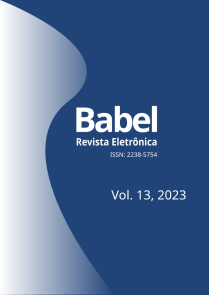The importance of English in Corporate Communication undergraduate courses
DOI:
https://doi.org/10.69969/revistababel.v13i.16007Keywords:
English, Corporate Communication, Foreign language teaching/learningAbstract
This article aims to identify possible impacts to students, graduates, and teachers from the study of English from a course in the segment of Management and Business from the National High Education of Technologist Catalog (2016). So it was chosen a Corporate Communication course in which the study of English is mandatory. As mentioned in the official document from this course (2018), fluency in English is an important tool for communicators in the job market. From the perspective of authors such as Duboc and Siqueira (2021), Siqueira (2018) and Kumaravadivelu (2012), we sought to understand which English type is present in the imagination of students and how the mandatory of this study impacts the learners. The investigation was carried out from qualitative research based on an open and close questionnaire.
Downloads
References
CAMPOS, Ana Raquel F. F. O ensino de inglês como língua franca: perspectivas docentes em contexto. 2019. Tese (Doutorado), - Curso de Letras, Universidade Federal do Paraná, Paraná, p. 80, 2019. Disponível em: <https://acervodigital.ufpr.br/handle/1884/62370>. Acesso em: 31 mar. 2022.
COELHO JR., P. J. Diversidade nas Organizações: entre a Riqueza Cultural e a Disputa Política. In: MOURA, C. P.; FERRARI, M. A. Comunicação, interculturalidade e organizações: faces e dimensões da contemporaneidade. Porto Alegre: EDIPUCRS, 2015. p. 67-96.
COGO, D. Comunicação e Diversidade: Cenários e Possibilidades da Comunicação Intercultural em Contextos Organizacionais. In: MOURA, C. P.; FERRARI, M. A. Comunicação, interculturalidade e organizações: faces e dimensões da contemporaneidade. Porto Alegre: EDIPUCRS, 2015. p. 97 -116.
DUBOC, Ana Paula M.; SIQUEIRA, Domingos Sávio P. ELF feito no Brasil: expanding theoretical notions, reframing educational policies. Status Quaestionis: language, text, culture, v. 2, n. 19, p. 303, 2021. Disponível em: <https://www.researchgate.net/publication/349662276_ELF_feito_no_Brasil_expanding_theoretical_notions_reframing_educational_policies>. Acesso em: 08 dez. 2022.
HAUS, C. Inglês como Língua Franca e Prática Translíngue: Uma Perspectiva Possível. Revista Versalete, Curitiba, Vol. 7, No. 12, p. 57, 2019. Disponível em: <http://www.revistaversalete.ufpr.br/edicoes/vol7-12/3HAUS.%20Camila.%20Ingl%C3%AAs%20como%20l%C3%ADngua..pdf>. Acesso em: 08 dez. 2022.
JORDÃO, C. ILA – ILF – ILE – ILG: Quem dá conta? Revista Brasileira de Linguística Aplicada, Belo Horizonte, Vol. 14, No. 1, p. 27, mar. 2014. Disponível em: <https://www.scielo.br/j/rbla/a/VBC45fDYvxV5BXwvmLVDh4m/abstract/?lang=pt>. Acesso em: 08 dez. 2022.
KRAMSCH, C. Between Globalization and Decolonization Foreign Languages in the Cross-Fire. In: MACEDO, D. Decolonizing Foreign Language Education The Misteaching of English and Other Colonial Languages. Routledge, New York, 2019.
KUMARAVADIVELU, B. Language Teacher Education for a Global Society: A Modular Model for Knowing, Analyzing, Recognizing, Doing and Seeing. Nova York: Routledge, 2012A, p. 4-7.
______. Individual identity, cultural globalization and teaching English as an international language: The case for an epistemic break. In: ALSAGOFF , L.; MCKAY S. L.; HU, G.; RENANDYA, W. A. (Eds.), Principles and practices for teaching English as an international language (pp. 9-27). New York: Routledge, 2012B.
MARCHIORI, M. Sujeitos em Diálogos nos Processos Interculturais. In: MOURA, C. P.; FERRARI, M. A. Comunicação, interculturalidade e organizações: faces e dimensões da contemporaneidade. Porto Alegre: EDIPUCRS, 2015. p. 135 – 154.
MOURA, C. P.; FERRARI, M. A. Comunicação, interculturalidade e organizações: faces e dimensões da contemporaneidade. Porto Alegre : EDIPUCRS, 2015.
SCHÜTZ, Ricardo. Inglês como língua internacional. 2010. Disponível em: <http://www.sk.com.br/sk-ingl.html>. Acesso em: 26 mar. 2022.
RAJAGOPALAN, Kanavillil. The identity of “World English”. New Challenges in Language and Literature, Belo Horizonte: FALE/UFMG, p. 97-107, 2009. Disponível em: <http://www.leffa.pro.br/tela4/Textos/Textos/Livros/New_Challenges/07-Kanavillil%20Rajagopalan.pdf>. Acesso em: 08 dez. 2022.
______. “O papel eminentemente político dos materiais didáticos de inglês como língua estrangeira.” In: SCHYERL, D.; SIQUEIRA, S. (Orgs.) Materiais didáticos para o ensino de línguas na contemporaneidade: contestações e proposições. Salvador: EDUFBA, 2012.
SIQUEIRA, Domingos Sávio P. Inglês como Língua Franca Não é Zona Neutra, é Zona Transcultural de Poder: Por Uma Descolonização de Concepções, Práticas e Atitudes. Línguas Letras, v. 19, n. 44, p. 94-105, 2018. Disponível em: <https://e-revista.unioeste.br/index.php/linguaseletras/article/view/20257>. Acesso em: 08 dez. 2022.
_______. Universidade Federal do Paraná. Setor de Educação Profissional e Tecnológica. Projeto Pedagógico do Curso Tecnologia em Comunicação Institucional. Paraná, p. 4, 2010. Disponível em: <http://www.sept.ufpr.br/portal/comunicacaoinstitucional/wp-content/uploads/sites/5/2018/04/Projeto-Pedagogico-TCI.pdf>. Acesso em: 08 dez. 2022.
_______. Universidade Federal do Paraná. Setor de Educação Profissional e Tecnológica. Projeto Pedagógico do Curso Tecnologia em Comunicação Institucional. Paraná, p. 11-13, 2018. Disponível em: <http://www.sept.ufpr.br/portal/comunicacaoinstitucional/wp-content/uploads/sites/5/2019/07/Projeto-Pedag%C3%B3gico-2018.pdf>. Acesso em: 08 dez. 2022.
YIN, Robert K. Pesquisa Qualitativa do Início ao Fim. Porto Alegre: Grupo A, 2016. Disponível em: <https://integrada.minhabiblioteca.com.br/#/books/9788584290833/>. Acesso em: 31 mar. 2022.
Published
How to Cite
Issue
Section
License
Copyright (c) 2023 Babel: Revista Eletrônica de Línguas e Literaturas Estrangeiras

This work is licensed under a Creative Commons Attribution-ShareAlike 4.0 International License.
Os autores detém os direitos autorais sem restrições, porém ao submeter os originais, concordam em transferir a este periódico os direitos da primeira publicação. Isto deve ser informado em caso de nova edição do texto. As produções que derivarem deste material, devem obrigatoriamente citar a fonte. Os textos publicados nesta revista, salvo indicações contrárias, encontram-se sob uma licença Creative Commons Atribuição 4.0 Internacional.

